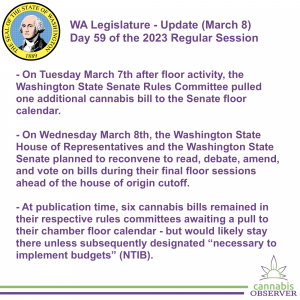Following the calendaring of one bill on Tuesday, four cannabis bills were positioned for action in the Senate - but time was running out before the house of origin cutoff on Wednesday at 5pm.
Here are some observations of the Washington State Legislature (WA Legislature) for Wednesday March 8th, the 59th day of the 2023 Regular Session.
My top 3 takeaways:
- On Tuesday March 7th after floor activity, the Washington State Senate Rules Committee (WA Senate RULE) pulled one additional cannabis bill to the Senate floor calendar.
- SB 5363 - "Concerning cannabis retailer advertising."
- Senator Drew MacEwen’s bill to shift cannabis retail signage to local control was included in the regular package pull quickly approved by members after adjournment yesterday.
- SB 5363 - "Concerning cannabis retailer advertising."
- On Wednesday March 8th, the Washington State House of Representatives (WA House) and the Washington State Senate (WA Senate) planned to reconvene to read, debate, amend, and vote on bills during their final floor sessions ahead of the house of origin cutoff.
- WA House members planned to convene at 10:30am PT. At publication time, no cannabis bills had been advanced to the house floor calendar.
- WA Senate members planned to convene at 9am PT. At publication time, four cannabis bills had been advanced to the senate floor calendar:
- SB 5340 - "Regarding limits on the sale and possession of retail cannabis products."
- At publication time, there were no published amendments.
- SB 5363 - "Concerning cannabis retailer advertising."
- At publication time, there were no published amendments.
- SB 5377 - "Concerning cannabis license ownership."
- At publication time, there were no published amendments.
- SB 5546 - "Establishing a Washington state cannabis commission."
- Striking amendment S-2185.3 by Senator Mark Schoesler would incorporate changes in amendment S-2063.1 by prime sponsor Senator Sharon Shewmake which would redefine “active” producers and processors; enable electronic voting; and prioritize diverse representation.
- In addition, Schoesler’s striker would substantially modify the participation criteria for a successful referendum (bumping from 30% to 40% of producers and processors), subsequent changes to the assessment (requiring a supermajority of 60% assent rather than a simple majority of 51%), and staffing for the commission (which would have to be contracted until assessment revenue exceeds $1M).
- For comparison purposes, Schoesler’s amendment would demand higher participation and consent rates than any other agricultural commodity commission established by statute.
- SB 5340 - "Regarding limits on the sale and possession of retail cannabis products."
- At publication time, six cannabis bills remained in their respective rules committees awaiting a pull to their chamber floor calendar - but would likely stay there unless subsequently designated “necessary to implement budgets” (NTIB).
- HB 1159 - “Allowing interstate cannabis agreements.”
- Divergent senate companion legislation, SB 5069, had already been passed by that body, introduced in the House, and referred to the Washington State House Regulated Substances and Gaming Committee (WA House RSG).
- HB 1249 - “Regarding limits on the sale and possession of retail cannabis products.”
- Identical senate companion legislation, SB 5340, had been pulled to the Senate floor calendar for potential action.
- HB 1453 - “Providing a tax exemption for medical cannabis patients.”
- HB 1650 - “Requiring voter approval for local government prohibitions on cannabis businesses.”
- HB 1822 - “Concerning complimentary products provided by short-term rental operators to guests.”
- SB 5376 - “Allowing the sale of cannabis waste.”
- At publication time, 73 bills remained assigned to WA Senate RULE and 154 bills were assigned to the Washington State House Rules Committee (WA House RULE). 129 bills awaited action on the WA Senate floor calendar compared to 111 bills in the House.
- Legislation can be declared "necessary to implement budgets" (NTIB), an informal procedure leadership can exercise around any bill with a fiscal impact. The criteria for NTIB status and the decision making around the designation hadn’t been set in law or rule, allowing for a bypass of the cutoff calendar which is agreed to by both chambers through the legislative process.
- HB 1159 - “Allowing interstate cannabis agreements.”
